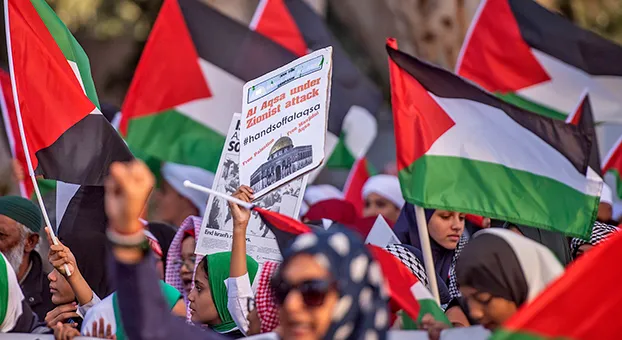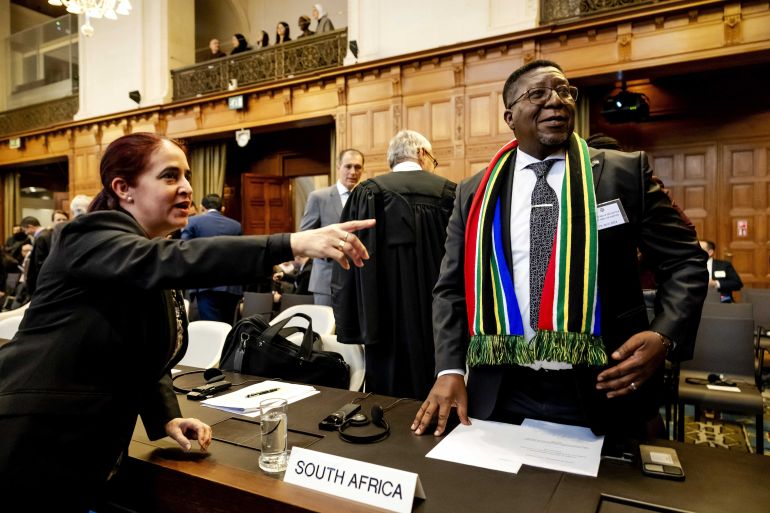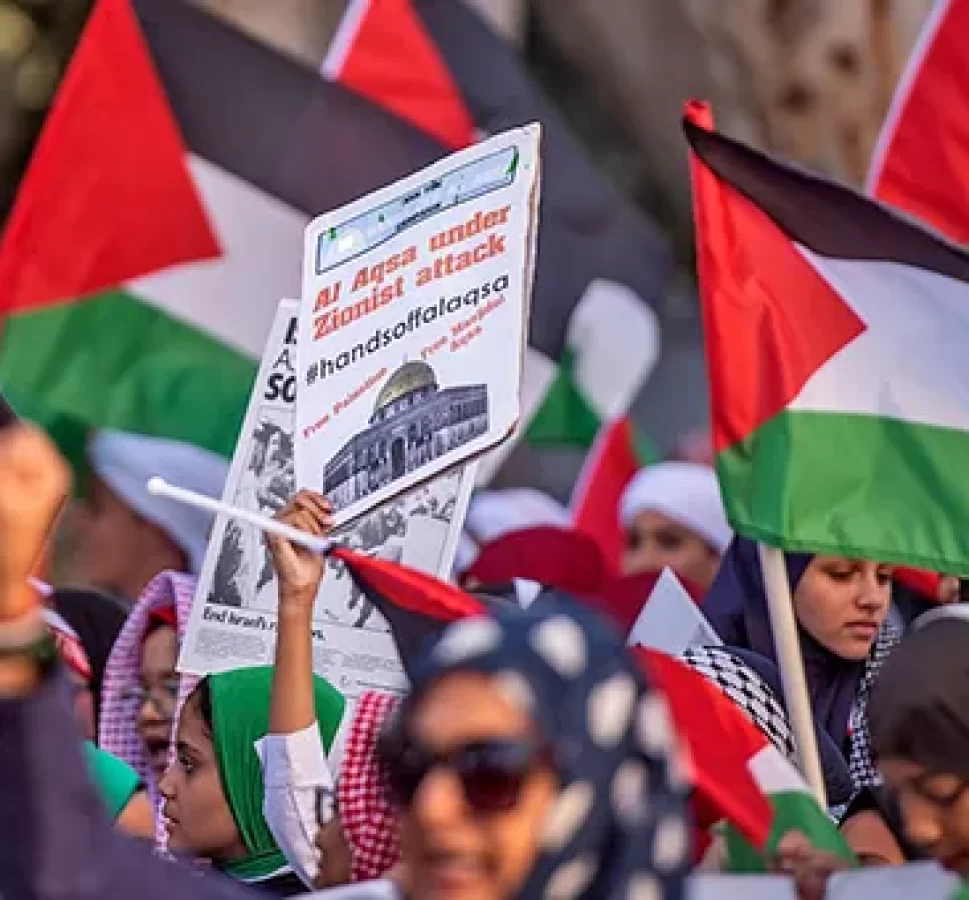
Cape Town, South Africa – Three months to South Africa’s much-anticipated general elections, the political landscape is being remade.
Since Cyril Ramaphosa became president in 2018, domestic issues like corruption within the government, rolling power cuts, and a wobbling economy have been hotly debated but Israel’s war in faraway Gaza has become a key election issue in recent months.
Since the apartheid era, the topic of Palestine has been a major point of division in South African politics as the white government stood firmly with Israel while the anti-apartheid movement saw Palestinian resistance aligned with its own.
But Israel’s continuing war in Gaza since October has forced political parties to lay their cards on the table. The two largest parties in particular – the ruling African National Congress (ANC) and the main opposition the Democratic Alliance (DA) – are likely to see their constituencies change because of their positions on the war.
The ANC-led government has been unambiguous in its pro-Palestine stance. South Africa was one of the first states to refer to Israel’s actions in Gaza after the October 7 Hamas attack as “genocide”, and early on referred Israel to the International Criminal Court. In January, Pretoria also dragged Israel to the world’s highest legal authority, the International Court of Justice.
The DA, on the other hand, has flip-flopped between its initial steadfast support for Israel and more recent ambivalent rhetoric about “peace”.
On October 8, Emma Powell, the DA shadow minister for international relations and cooperation, released a statement condemning “Hamas’ unprovoked attack on Israeli territory today during the religious holiday of Simchat Torah … The DA condemns this senseless violence and all acts of terror against innocent civilians, women, and children and calls for aggressors to this conflict to immediately withdraw.”
A month later, as the number of deaths in Gaza rose drastically, the party shifted to more centrist rhetoric, with leader John Steenhuisen saying: “The (DA) stands in solidarity with both Palestinians and Israelis who seek a two-state solution … we embrace rationality based on peaceful co-existence for both a secure Israel and a free Palestinian state.”
Unlike the Economic Freedom Fighters and other smaller opposition parties, the DA has never called for a ceasefire or used the term “genocide” regarding Israel’s killing of Palestinians.
And ahead of the May 29 vote, it is the ANC’s moves that have proven to be wildly popular within and beyond South Africa.

A realignment of the electorate
Before October, the chances of the DA pulling off an upset at the national level were rising.
In the 2019 general election, voter turnout was only 49 percent – the lowest since the first democratic vote in the country in 1994.
The ANC also seemed like a party running aground, with fewer than 50 percent of respondents in an October survey by the Social Research Foundation (SRF) supporting it. Protests against soaring costs of living were becoming frequent and Ramaphosa’s re-election campaign was enmeshed in a scandal after about $500,000 in cash was stolen from his game farm.
But the parties’ differing positions on the war have helped boost the ailing ANC’s chances.
In the Western Cape Province, which has been governed by the DA since 2009 and where it traditionally dominates, a realignment of the electorate is under way. The province, one of South Africa’s largest, is home to Cape Town, the country’s parliamentary capital and second-largest city.
Luwayne Pretorius, a 46-year-old beauty industry worker there says that as a gay Afrikaner man, the ANC gave him more rights than any other country in the world, but his loyalty shifted to the DA when Ramaphosa’s predecessor Jacob Zuma took power in 2009.
Zuma, who in 2006 said same-sex marriages are “a disgrace to the nation and to God”, has also been implicated in several corruption scandals during his tenure which ended in 2018.
However, Pretorius’s stance has changed drastically due to current events.
“By being so fervent in taking a stance against apartheid Israel, it really says something about the ANC,” Pretorius said. “But with the DA, especially after apartheid, there is no way for a party to justify supporting another country committing an ethnic cleansing while simulating an apartheid state similar to what we saw in South Africa.”
Historically, foreign policy has not influenced the voting decisions of South Africans, says Robert Mattes, a professor of government and public policy at the University of Strathclyde and co-founder of Afrobarometer, a pan-African political survey organisation.
“There is a lot of activism in Cape Town largely in the coloured community and the Muslim portion of that community, but this is likely the portion of voters already voting ANC. For Muslim voters who are highly motivated by a party’s approach to Palestine, those who vote for the DA will be irritated and revolted, but not enough for them to move to the ANC. If they move away from the DA, it will be to smaller parties.”
Na’eem Jeenah, senior researcher at the Johannesburg-based think tank Mapungubwe Institute for Strategic Reflection (MISTRA), agrees with Mattes that in general, South Africans vote primarily based on domestic issues.
But this time will be different, he says.
“There certainly will be a shift of voters away from the DA as a result of its support for Israel and its refusal to speak about the genocide in Gaza,” Jeenah told Al Jazeera.
He predicts that while some will vote ANC because of their pro-Palestine actions, many others will choose other parties like the Muslim party Al Jama-ah to protest against the DA without “rewarding the ANC with their vote”.

Changing positions, switching allegiances
Some say the DA’s initial stance has changed due to growing anger in its large and crucial Muslim and Black constituencies, especially in the Western Cape, about the war.
But the party’s efforts are not yielding the desired outcome yet.
Cape Town Mayor Geordin Hill-Lewis, of the DA, pledged 400,000 rand ($20,790) and free usage of a stadium for two friendly matches between the Palestine men’s national team and two South African teams in February.
But when the first match was played, President Ramaphosa, who attended the game, was welcomed and cheered. Contrastingly, Hill-Lewis, who Pretorius says is “throwing crumbs to the population”, was booed.
The ANC and DA did not respond to Al Jazeera’s requests for comment on the issue of the Gaza war affecting voter decisions in the coming election.
But within the electorate, many have already decided which party to vote for.
Nazeck Booley, a former DA voter, is switching allegiance to a smaller party.
“This war has given me more awareness about what is happening in the city [Cape Town] and that apartheid is alive and well. It felt like a jolt to reality. I always had a vision of the DA as citizen-centric and keeping the city running better than others in South Africa, but I didn’t realise what truly drives them … anyone with a conscience will not vote DA.”
Wiedaad Achmat, an avid DA supporter is “99 percent sure” she will vote ANC, which she says has made her proud to be South African and “stood up to a whole lot of bullies”.
Her decision, she says, is because “the DA are racist, and serve a murderous, genocidal, vile, warmongering Israeli government”.
“Previously, I could not in good conscience cast a vote for ANC because they’ve looted the coffers and lined their pockets and are corrupt and immoral … basically all government institutions, are a huge failure” she added. “This is the one percent that is holding me back but for me, the ANC’s stance against Israel supersedes the load-shedding woes and the state of our economy.”






